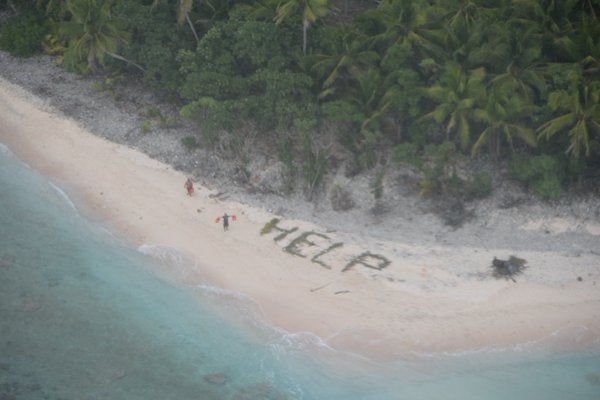Three men rescued from remote island after writing ‘help’ on the sand
They were stranded for three days

Your support helps us to tell the story
From reproductive rights to climate change to Big Tech, The Independent is on the ground when the story is developing. Whether it's investigating the financials of Elon Musk's pro-Trump PAC or producing our latest documentary, 'The A Word', which shines a light on the American women fighting for reproductive rights, we know how important it is to parse out the facts from the messaging.
At such a critical moment in US history, we need reporters on the ground. Your donation allows us to keep sending journalists to speak to both sides of the story.
The Independent is trusted by Americans across the entire political spectrum. And unlike many other quality news outlets, we choose not to lock Americans out of our reporting and analysis with paywalls. We believe quality journalism should be available to everyone, paid for by those who can afford it.
Your support makes all the difference.They had no choice but to swim.
The three men had left just hours earlier when a large wave capsized their 19-foot skiff on Monday night. They swam through two miles of dark water before finding salvation: the tiny Pacific Island of Fanadik, several hundred miles north of Papua New Guinea.
For three days, the men remained stranded on the uninhabited island, hoping for help. In the end, their own ingenuity would facilitate their rescue: The crew aboard a Navy plane spotted the men waving life jackets, standing next to piles of palm leaves arranged to spell out four capital letters: H-E-L-P.
Once found, their families were notified and, in the end, they were put on a small local boat back to Pulap, from where they initially set out to sea. No injuries were reported.
The men were recovered on Thursday thanks to the coordinated efforts of Navy and Coast Guard rescuers.
The Coast Guard was first notified that they were missing just before noon on Tuesday, after which it immediately issued an urgent broadcast seeking assistance from the Navy and vessels in the area of the skiff's last known location. Two cargo ships helped by conducting a combined 17-hour search. The Navy plane that ultimately spotted the men set off Thursday at 6 a.m., taking just about two hours to find them.
"Our combined efforts coupled with the willingness of many different resources to come together and help, led to the successful rescue of these three men in a very remote part of the Pacific," Lt. William White, a Coast Guard spokesman, said in a statement.
The Coast Guard in that region of the Pacific -- Coast Guard District 14 -- has coordinated seven such search-and-rescue efforts in the past two weeks, enlisting the help of 10 volunteer vessels and six aircrews, according to a news release following last week's rescue. Fifteen lives were saved over that period, starting on March 28, the news release said.
"The Coast Guard 14th District covers an area of responsibility more than 12.2 million square miles of land and sea, an area almost twice the size of Russia," Jennifer Conklin, search and rescue mission coordinator at the Coast Guard Command Center Honolulu, said in a statement. "Oftentimes, we are thousands of miles away from those who need help and because of that our partnerships with the Navy, other search and rescue organizations, partner Pacific nations and AMVER are essential."
Copyright: Washington Post
Join our commenting forum
Join thought-provoking conversations, follow other Independent readers and see their replies
Comments